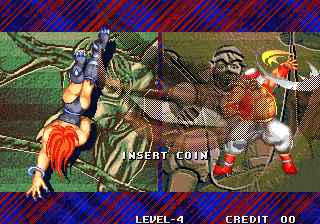Transparency effects: Difference between revisions
Jump to navigation
Jump to search
(Created page with "The video hardware doesn't support real transparency between sprites. Developers had to come up with ways of faking it with different methods like quickly alternating images…") |
mNo edit summary |
||
| (6 intermediate revisions by the same user not shown) | |||
| Line 1: | Line 1: | ||
The video hardware | The NeoGeo video hardware only supports 1-bit transparency: a pixel is either opaque or transparent. | ||
Developers had to come up with ways of faking | Developers had to come up with ways of faking semi-transparency with different methods like fast blinking (often used for shadows), or only having one out of two pixels drawn. | ||
Blinking can appear buggy in emulators if frameskip is necessary. | |||
<gallery heights=224px widths=320px> | <gallery heights=224px widths=320px> | ||
File:Breakerst. | File:Breakerst.gif|1-of-2 pixel trick in [[Breakers]] | ||
File:Fatfury3blink.gif|Blinking sprite in [[Fatal Fury 3]] (slowed down) | File:Fatfury3blink.gif|Blinking sprite in [[Fatal Fury 3 - Road to the Final Victory]] (slowed down) | ||
</gallery> | </gallery> | ||
[[Category:Code]] | [[Category:Code]] | ||
Latest revision as of 09:35, 24 June 2017
The NeoGeo video hardware only supports 1-bit transparency: a pixel is either opaque or transparent.
Developers had to come up with ways of faking semi-transparency with different methods like fast blinking (often used for shadows), or only having one out of two pixels drawn.
Blinking can appear buggy in emulators if frameskip is necessary.
-
1-of-2 pixel trick in Breakers
-
Blinking sprite in Fatal Fury 3 - Road to the Final Victory (slowed down)
